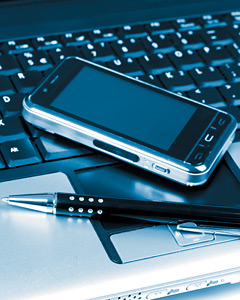I've had discussions with a good friend of mine, Sy Ogulnick, for more than 30 years on the subject of how to achieve "honest communications." This past week, he and I were examining the issue of technology and how this is impacting honest communication, doctor-patient relationships, and interactions between parent and child, employee and employer and friend to friend.
I have this constant tension of push and pull in both directions. I want to learn how to use and benefit from the remarkable phenomena we call personal connectivity, and at the same time refuse to have it replace the "face to face" dialogue I have so tenaciously clung to all my life. I constantly try understand, use and teach how to continue to grow in the most modern technological sense without giving up the "diamond" we have in our hand that we label genuine dialogue.
 On a personal note, I am witnessing before my very eyes the benefits the iPad is having on my nonverbal autistic grandson. Today's affordable technology, which only a decade ago seemed impossible to conceive, much less to afford, is now here, and this very technology is permitting monumental communication breakthroughs for thousands of individuals who are verbally challenged and otherwise have no hope to communicate. So, the technological revolution has enormous benefits along with its equally compelling risks.
On a personal note, I am witnessing before my very eyes the benefits the iPad is having on my nonverbal autistic grandson. Today's affordable technology, which only a decade ago seemed impossible to conceive, much less to afford, is now here, and this very technology is permitting monumental communication breakthroughs for thousands of individuals who are verbally challenged and otherwise have no hope to communicate. So, the technological revolution has enormous benefits along with its equally compelling risks.
My recent discussion with Sy was a reminder to me that communication "between people" is demanding and complex, regardless of whether it takes place via technology or face to face. The difference today is that we are more "in touch" with each other than at any time in human history. Where is there a place that people are not connected?
However, being in touch (connected) today is like walking on water; we are communicating to each other, but not getting wet. Face-to-face dialogue means getting wet. Genuine dialogue is like having a spiritual (full-immersion) experience.
Losing Meaningful Dialogue
Today, our technology-aided communication is a very dry experience; not merely dry, but antiseptic. What we touch is not each other, but a tool that seems to provide a very safe harbor in order to avoid true face-to-face communication. Too few individuals are immersed in significant relationships that require / demand a sharing of space separated by a few feet, often only a few inches. Contrast that with an environment in which eye-to-eye contact and truth-revealing body language give us a full-bodied message, rather than only seeing sterilized words on a screen.
Is it too big of a "leap of faith" to understand that what is now called dialogue takes place through small, hand-held objects and computers at distances that may cover the world, but not truly uncover our intimate thoughts and meanings? Yes! The amount, speed and kind of data that is transferred between people is not simply remarkable, but shaping our world.
The miracle of demonstrations in Egypt that led to the removal of President Hosni Mubarak was largely precipitated by this technology, without which issues of unrest may have simmered for another 30 years. What nation, business, community, religious institution or family is not in some way affected by this technological revolution? People movements from the Tea Party to those on the other side of the political spectrum know the power of technology. Many, however, do not fully grasp its possibilities because technology changes, metamorphosizes before our eyes. It is a tool that, one day in the not-too-distant future, may even control us.
The Cost of Technology
Stories abound at the marvel of instant communication – the ability to provide instant feedback and instant gratification. There are advertisements celebrating the that we no longer need to have meetings face-to-face because of new software that connects everyone from the comfort of the home or office, saving thousands of dollars, hundreds of hours, and expediting processes that previously took months.
However, the question must be raised: At what cost? The true cost of technology on human relationships has not been honestly explored. Is saving time at the expense of authentic relationships worth the price? Is the wired or wireless form of communication eventually going to replace the need for us to connect "face to face?" It may or may not, but at what cost to creativity, productivity and personal relationships at every possible level? We cannot know today, but we will soon find out. Can we truly build an intimate human bond at a distance, be it geographic, personal and/or experiential?
Preserving True Relationships
So, what's the point? Stated succinctly, if we are to hold on to our humanity and the primary purpose of our being, it must be through our relationships with each other, and what I still believe true relationships are about: being there for each other, hearing and understanding each other, respecting individual differences, and yes, loving those who need our love, not expressing an obligatory or cryptic "love you" in an e-mail – which, in my opinion, is comparable to a personal letter with a "To Whom It May Concern" salutation. We must be present with each other when we do meet face to face; otherwise, how do we confirm each other?
Candor shielded by the safety of distance and technology is not the candor of genuine dialogue, but rather dialogue camouflaged by the protection of virtual anonymity. This lack of present-time dialogue appears to be happening in many relationships, which is probably the reason for immersion in avatars and other virtual-world creations where there is neither the possibility of personal harm nor the opportunity for true dialogue.
It has been said that if one can count five friends in a lifetime, they will have lived a rich, full life. We may call the multitudes we reach on Twitter, Facebook and e-mail our "friends," but I think the definition of friend has been emasculated to be almost meaningless. Perhaps it is truly time to reconnect more with those who are important and disconnect more with the artificial world of friendships.
Building these human bonds of connectivity is more critical than ever before. As doctors, there is an inseparable doctor-patient bond that is necessary for healing to take place. The placebo effect is enhanced, the belief system is reinforced, the confidence factor is magnified and that indescribable bond of connectivity blossoms, resulting in immeasurable and intangible benefits to the health care experience.
A Communication Challenge
Try this challenge for a month. In the course of your day, put aside, as often as possible, all the technology you normally use to communicate and begin, with your truly select friends, a dialogue that is genuine. Be with each other when with each other, show respect for the uniqueness that is brought to the table, listen and confirm what is being said (this has nothing to do with agreement), and express your truth; not as a definitive truth that wins over their truth, but simply your truth versus their truth. Finally, look into their eyes as they look into yours. This oldest and most permanent of communication "tools" I label genuine dialogue is the only communication tool that costs nothing to use, but achieves the most connectedness possible.
Perhaps if this were done, we would truly be reconnected to each other in a more meaningful way; one that transcends the superficial and begins to recognize that the most important things in life are not things. See if this short-term "communication trial" will result in a renewed relationship with whomever you have decided that genuine dialogue is important.
There is no limit to how genuine dialogue affects us every day. As fathers, mothers, husbands, wives, doctors, patients, employers, employees, etc., being present and communicating honestly will open new vistas for relationships never dreamed possible. Maybe it is time we recognized that technology, like stress, is neither positive nor negative, in and of itself; it's how we internalize it. Perhaps stepping back to view the total picture of how we connect will get us closer than we have ever been.
Connectivity is not just about being in-touch with an e-mail, tweet or a Facebook page; it's also about being in-touch as individuals on a human level that enables genuine dialogue to take place. Keep in mind that this is not an "either/or"discussion, but a discussion about having the best of both worlds. Technology and genuine dialogue are both necessary elements of our lives. Our collective challenge is to find the ideal balance between the two.
Click here for previous articles by Louis Sportelli, DC.





